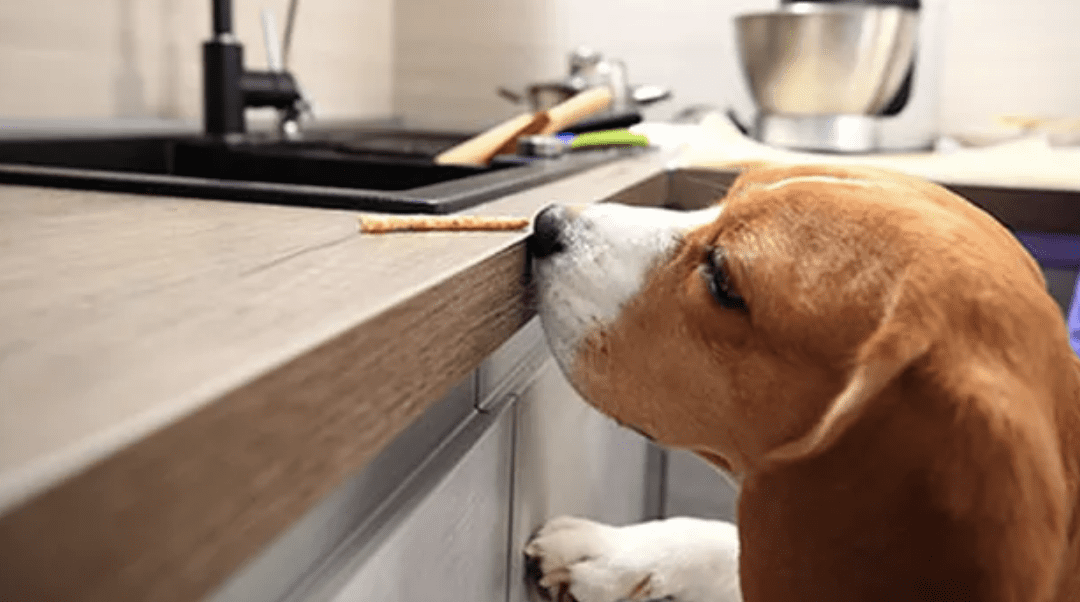Food is survival for all species; food provides nourishment for life. Some dogs, however, take this fact of life way too seriously and will eat any and all food or food-related items they can find. This might be dinner on the dining room table, a snack left on the coffee table, or groceries on the kitchen counter.
Unfortunately, this can be so dangerous. A hot pan can scald, hot food can burn the mouth, cooked bones can wreak havoc on the dog’s intestinal tract, and not all foods we can eat are safe for dogs. Plus, there’s also the annoyance factor when your dog eats your dinner before you get a chance to even grab a bite of it.
Food is the Best Reward
Once a dog has learned that there is food on the kitchen counter (or coffee table, dining room table, or kitchen trash can) he will remember. Dogs remember actions that are rewarding and since food is the best reward, he will try to perfect his counter surfing or trash can raiding skills.
As you begin changing his habit, keep this in mind. Keep the kitchen counters cleared of food, empty the kitchen trash can more often than normal, and pay attention to all food — meals, snacks, leftovers, or ingredients for cooking.
Be Proactive
When food is out and potentially within your dog’s reach, don’t wait until your dog makes a mistake. Instead, be proactive and prevent your dog from getting into trouble.
If you have taught your dog the Leave It exercise, practice that often around food and food items. Most trainers teach this in basic obedience classes and it means, ‘Ignore that.’ If you haven’t taught this to your dog, contact a local trainer for some guidance.
Teaching your dog to stay out of the kitchen is great too, both to decrease food stealing but also so you won’t trip over him. You can have him do a Down Stay just outside of the kitchen or even better, teach him to lie down and stay on his bed in the family room or living room.
If people are moving around the house and having your dog do a down stay isn’t a good option, let him drag a leash so if he makes a dash for something, you can step on his leash and stop him.
When Your Dog is Left Alone
Some dogs figure out that when they are left home alone, no one can tell them to leave the food or trash alone. The dog then begins to hunt for food as soon as you walk out the door.
For many dogs, even the hunt is rewarding. Just as a dog hunting lizards in the back yard will keep hunting even though he doesn’t catch a lizard each time he hunts, food stealing dogs will keep hunting too.
It’s important then to make sure all food and trash is put away. Plus, the dog needs to be kept away from the kitchen. Put him in his crate, in an exercise pen, or have baby gates up to restrict his access.
Don’t Get Angry
If your dog evades your efforts to prevent food stealing and he gets a hold of something, don’t yell, hit, or otherwise get angry. Punishing your dog after the fact isn’t good dog training and it won’t stop food stealing. Your dog may become sneakier about doing it when you can’t catch him, but he’ll still be doing it.
Instead, look at what happened, when, and how your dog did it. Then work to prevent it in the future. Look too at how to use the Leave It exercise and other training techniques to communicate with your dog as to what is allowed and what isn’t.
https://www.embracepetinsurance.com/waterbowl/article/discouraging-counter-surfing

